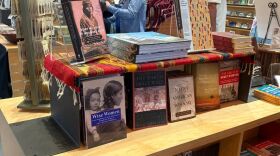-
The Trump administration's deadline to “review and remove” passed with shops closed for the season.
-
Broken windows, pried off protective plywood and graffiti at the historic landmark’s hospital occurred as recently as last Thursday.
-
Heart Mountain will work with four former Japanese-American incarceration sites on educational programming. They’ll train kindergarten through grade 12 teachers in about a dozen states.
-
Longtime U.S. Sen. Al Simpson died March 14 at his home in Cody at the age of 93. Simpson was first elected to the U.S. Senate in 1978 and served in that role for 18 years.
-
Shuko Yoshikami, who's now 86, was just four years old when he, his parents and three siblings were sent by train from southern California to Heart Mountain. They spent about three years there.
-
After touring a museum and looking at original barracks as part of a field trip to the World War II-era Japanese-American confinement site, Shuko Yoshikami shared how we can get to know one another and avoid mistakes of the past.
-
One of the few remaining structures at a former Japanese internment camp in Northwest Wyoming is one step closer to being restored.
-
The Heart Mountain Wyoming Foundation in Northwest Wyoming is organizing a charter bus trip from Los Angeles for its annual pilgrimage July 25-27th.
-
Wyoming K-12 teachers now have the option to teach lessons on Japanese-American incarceration in the state during World War II. An official partnership between the Heart Mountain Wyoming Foundation and the University of Wyoming (UW) helped make it happen.
-
Compelled into History against his will, a survivor of Japanese-American internment shares his storyJapanese-American Sam Mihara was only nine years old when the United States government used fear and security to justify his family's imprisonment at the Heart Mountain Internment Camp in northwestern Wyoming for the entirety of World War II. Since then, Mihara has worked to make sure that history won’t repeat itself. Next week, he’ll be in Laramie for his speaking series “Memories of Imprisonment.” Wyoming Public Radio’s Jordan Uplinger spoke with Mihara.
© 2026 Wyoming Public Media
800-729-5897 | 307-766-4240
Wyoming Public Media is a service of the University of Wyoming
800-729-5897 | 307-766-4240
Wyoming Public Media is a service of the University of Wyoming

Play Live Radio
Next Up:
0:00
0:00
Available On Air Stations











